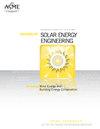基于熵产最小化原理的NaCl/KCl/MgCl2熔盐换热用光滑管和扭带插管尺寸优化
IF 1.9
4区 工程技术
Q3 ENERGY & FUELS
Journal of Solar Energy Engineering-transactions of The Asme
Pub Date : 2023-06-26
DOI:10.1115/1.4062719
引用次数: 0
摘要
以熵产最小化原理为准则,对采用NaCl-KCl-MgCl2和KCl-MgCl2熔盐的太阳能集热器和热交换器的流动和传热进行了优化。采用Nusselt数与Reynolds数的Gnielinski相关关系和Petukhov给出的Moody摩擦因数,计算光滑管内的对流换热系数和摩擦压力损失。对于扭曲螺纹插入管,采用Manglik和Bergles提供的Nu和摩擦系数方程。将传热系统的目标函数熵产率表示为雷诺数、普朗特数、热流密度、管径等的函数。通过分析,确定了最优雷诺数,从而确定了最优努塞尔数、对流换热系数、摩擦系数和管径,从而计算出最优流速。分析在500-700℃的流体温度范围内进行,该温度范围涵盖了聚光太阳能(CSP)系统中超临界CO2动力循环的运行温度。比较了光滑管和扭曲插接管的优化结果,这对光热系统太阳能接收器的设计具有重要意义。本文章由计算机程序翻译,如有差异,请以英文原文为准。
Optimization of Dimensions of Smooth and Twisted-Tape-Inserted Tubes for Heat Transfer with NaCl/KCl/MgCl2 Molten Salts by Principle of Entropy Generation Minimization
The entropy generation minimization principle is used as the criterion to optimize the flow and heat transfer of solar collectors and heat exchangers that use molten salts NaCl–KCl–MgCl2 and KCl–MgCl2. The Gnielinski correlation for the Nusselt number versus Reynolds number, as well as the Moody friction factor given by Petukhov, was used for the calculation of the convective heat transfer coefficient and pressure loss due to friction in smooth tubes. For twisted-tap-inserted tube, equations of Nu and friction factor provided by Manglik and Bergles were used. The objective function, the entropy generation rate of the heat transfer system, was expressed as the function of Reynolds number, Prandtl number, heating flux, tube diameter, etc. As a result of the analysis, the optimum Reynolds number was determined and thereby to determine the optimum Nusselt number, convective heat transfer coefficient, friction factor, and tube diameter, which also allows the calculation of optimum flow velocity. The analysis was conducted in the fluid temperature range of 500–700 °C, which covers the operation temperature for supercritical CO2 power cycles in concentrated solar power (CSP) system. Optimized results from the smooth tube and twisted-tap-inserted tube are compared, which is important to the design of solar receivers for CSP systems.
求助全文
通过发布文献求助,成功后即可免费获取论文全文。
去求助
来源期刊
CiteScore
5.00
自引率
26.10%
发文量
98
审稿时长
6.0 months
期刊介绍:
The Journal of Solar Energy Engineering - Including Wind Energy and Building Energy Conservation - publishes research papers that contain original work of permanent interest in all areas of solar energy and energy conservation, as well as discussions of policy and regulatory issues that affect renewable energy technologies and their implementation. Papers that do not include original work, but nonetheless present quality analysis or incremental improvements to past work may be published as Technical Briefs. Review papers are accepted but should be discussed with the Editor prior to submission. The Journal also publishes a section called Solar Scenery that features photographs or graphical displays of significant new installations or research facilities.

 求助内容:
求助内容: 应助结果提醒方式:
应助结果提醒方式:


